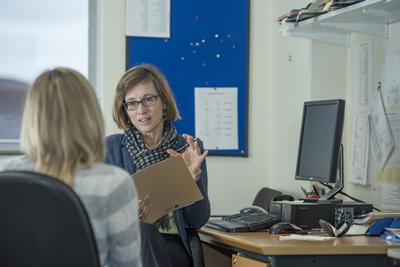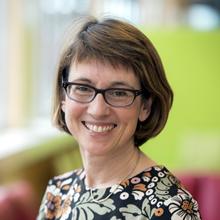Q&A with Professor Anneke Lucassen

The month of March marks International Women’s Day, which provides a fitting opportunity to acknowledge the extraordinary contribution that our female colleagues make to the Faculty of Medicine. Here we ask Professor Anneke Lucassen about her research career into clinical genetics and her work into the ethical and legal issues that genetics can raise.
Name: Anneke Lucassen
Position: Professor of Clinical Genetics
Research field: Medicine
What is your current research focus?
I’ve always been interested in translating relevant research findings to the patient in the clinic. I started by discovering genes important in diabetes in the laboratory and I became interested in what that- and other genetic discoveries meant for individuals and their families. I’m particularly interested in the ethical – and legal – issues that genetics can raise: what if one person discovers they have an inherited condition, but won’t (or can’t) tell their relatives that they too might have inherited it? Whose job – if anyone’s – is that? What if genetic testing uncovers some future risk you have no inkling of? How can you give meaningful consent to such unknown unknowns?
Why did you decide to focus your career on clinical genetics research?
It was all a bit random really, as I think probably so many careers are! I considered several other careers before ending up in clinical genetics, but I’m very happy here as it’s a really interesting specialty and there’s never a dull day! I see something new and interesting in every clinic I do, and the problems that arise in the clinic feed straight into my research programme, so I consider myself very lucky.
What have been your biggest ‘eureka’ moments in this field?
I’m not sure this counts as a eureka moment but about 10 years ago we did a sabbatical in Amsterdam and my daughters went to a Dutch primary school. I got a job as a dinner lady in part to see how they were getting on, thrown into the deep end of learning a new language and adapting to a different culture. Returning from a shift one day I received the news that I had been promoted to Professor at the University of Southampton. Hopefully I helped carve the way for other dinner ladies.
How would you describe the rate of progress in clinical genetics that you’ve witnessed?
The technology has advanced phenomenally quickly – we can now sequence in a few minutes sections of the genetic code that I spent years sequencing during my PhD! But the bottleneck of hurdles to be tackled has shifted. Now it’s interpreting what the sequence means that’s the time consuming step. Patients and clinicians often have a notion of a genome test result being like a blueprint – a nice clear prediction of what the future holds. This is so rarely the case: for example, lots of people want testing of the BRCA gene (the “Angelina Jolie gene”) to determine whether they have a risk of breast cancer, but 95 per cent of breast cancer cases aren’t due to this gene so a negative test really isn’t all that reassuring. And then detecting a variant in the gene in the absence of a family history of cancer means that its predictive value is likely to be much weaker than if you are tested because of your family history of cancer. I really enjoy putting these complexities into context for a particular person.
How has the role of women in scientific research changed during the course of your career?
My role model was my mother, who was the only woman in her university chemistry class in the 1950s. She had little patience for division of roles according to gender and completely assumed, and proved, she could do anything a man could. So looking back I think I was somehow protected from the pretty prevalent discrimination in the 70s and 80s by the environment in my family. My mother was one of two sisters, so was I, and I have only daughters so I’ve always just assumed science is gender neutral. I’m proud that my partner and I showed my daughters that parenting is about team work and that they can do whatever they want in their lives. From my own perspective I’ve always been more comfortable working as part of a team, and I think this is still less common at the top of the scientific ladder. Though my mother taught me not to make such generalizations, I wonder whether this still selects against women somewhat. Team work leadership would be a great innovation and one that would help women in scientific research.
What would you say is your proudest career achievement?
Steering a course that allowed me to have two fantastic daughters and develop a really interesting career. About 10 years ago I decided that I wanted to focus on the interdisciplinary space of science, medicine and ethics and this has been so interesting, capped recently by a five-year Wellcome Trust award together with a colleague in Brighton, to research exactly this area. It feels like I’ve had my cake and eaten it!
What excites you most about the future of clinical genetics research?
There’s so much still to do and so many interesting areas to explore. I can combine laboratory work, ethics research and clinical practice. I’m thrilled that others now also want to combine these different skills and there is a vibrant cohort of PhD students coming through who have each picked a key ethical issue and are researching it in a range of different settings. Finally people are beginning to see it’s so much more complex than just being able to decipher someone’s genetic code. That’s now the easy bit.
